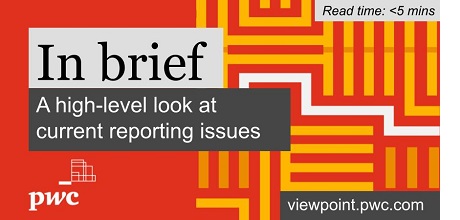Key points
The IASB has issued new disclosure requirements for supplier finance arrangements. The new disclosures will apply from 2024 and entities should prepare now to be ready for adoption.
What is the issue?
On 25 May 2023, the IASB issued
amendments to IAS 7 and IFRS 7 to require specific disclosures about supplier finance arrangements (SFAs). The amendments respond to investors that said they urgently need more information about SFAs to be able to assess how these arrangements affect an entity's liabilities, cash flows and liquidity risk.
To meet investor’s needs, the new disclosures will provide information about:
- The terms and conditions of SFAs.
- The carrying amount of financial liabilities that are part of SFAs and the line items in which those liabilities are presented.
- The carrying amount of the financial liabilities in (2) for which suppliers have already received payment from the finance providers.
- The range of payment due dates for both the financial liabilities that are part of SFAs, and comparable trade payables that are not part of such arrangements.
- Non-cash changes in the carrying amounts of financial liabilities in (2).
- Access to SFA facilities and concentration of liquidity risk with the finance providers.
Entities will be required to aggregate the information they provide about SFAs. However, entities should disaggregate information about terms and conditions that are dissimilar, disclose explanatory information when the range of payment due dates is wide, and disclose the type and effect of non-cash changes that are needed for comparability between periods.
What is the impact and for whom?
All entities that use SFAs in their operations will be required to provide the new disclosures provided they are material.
SFAs are described in the amendments as being characterised as arrangements in which one or more finance providers offer to pay amounts an entity owes its suppliers, and the entity agrees to pay according to the terms and conditions of the arrangement at the same date as, or a date later than, suppliers are paid. The arrangements typically provide the entity with extended payment terms, or the entity’s suppliers with early payment terms, compared to the related invoice payment due date.
Given the short implementation period, entities need to quickly start working to identify the complete list of arrangements that will be subject to these new disclosure requirements. Some of the disclosures may present challenges for entities to gather the information to be disclosed, and for auditors to gather evidence of their completeness and accuracy.
The disclosure about financial liabilities for which suppliers have already received payment from finance providers will be the most challenging (item 3 above) as many entities might not have ready access to all that information. Entities might need to put in place new processes and controls to ensure the complete and accurate gathering of this information. They might also need to review and amend the terms of the contractual agreements to be granted access to that information.
Entities and auditors should engage in discussions, as soon as possible, to assess the potential impacts of the need to produce these disclosure requirements in a relatively short period of time - see section below.
|
When does it apply?
The new disclosure requirements will be effective for annual reporting periods beginning on or after 1 January 2024. The unusually short implementation period was set considering:
- the urgent need for better information for investors about SFAs which have come under significant scrutiny recently,
- the fact that the amendments do not affect recognition or measurement principles, but only disclosure requirements, and
- introduction of similar disclosure requirements in US GAAP with a quick effective date.
The following reliefs will be available in the first year of application:
- Disclosure of comparative information: comparative information is not required during the first year the entity applies the amendments, that is, an entity with a closing reporting date of December 31, 2024 will not need to present the comparative information of 2023.
- Disclosure of specified opening balances: quantitative disclosures 2) to 4) are normally required at the opening and closing of each reporting period. However, considering the complexity that may exist for disclosures 3) and 4), in the first year of application, entities are provided with transition relief meaning the disclosures 3) and 4) are only required as of year-end.
- Interim financial statements: the required disclosures are only applicable for the annual periods during the first year of application. Therefore, the earliest that the new disclosure requirements are mandated is an annual reporting period ending 31 December 2024.
Where do I get more details?
Refer to
PwC’s In depth to find a comprehensive guide on the reporting requirements for supplier finance arrangements (including the new disclosure requirements).
For more information about the new disclosures, contact Gary Berchowitz or Marie-Claude Kling.













